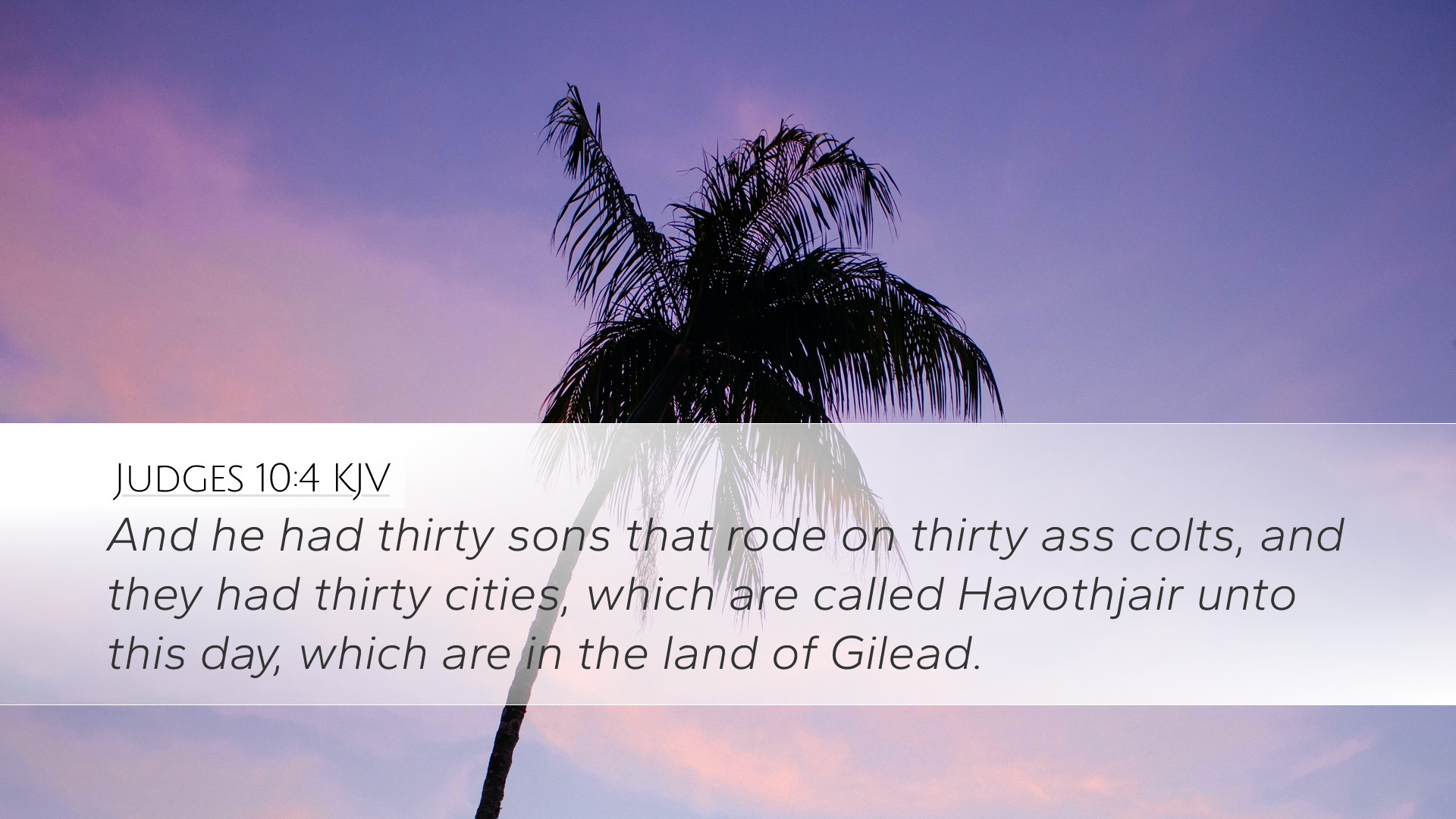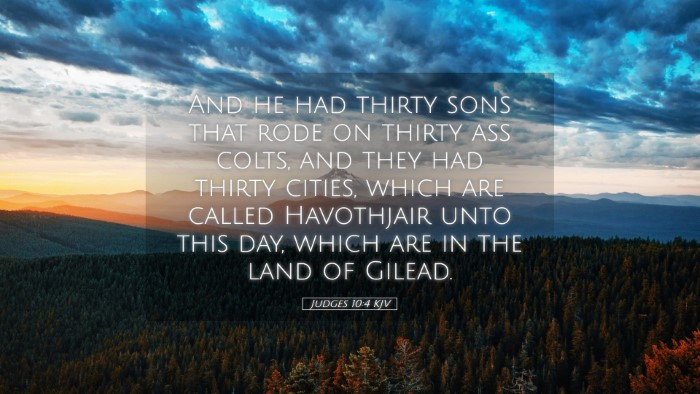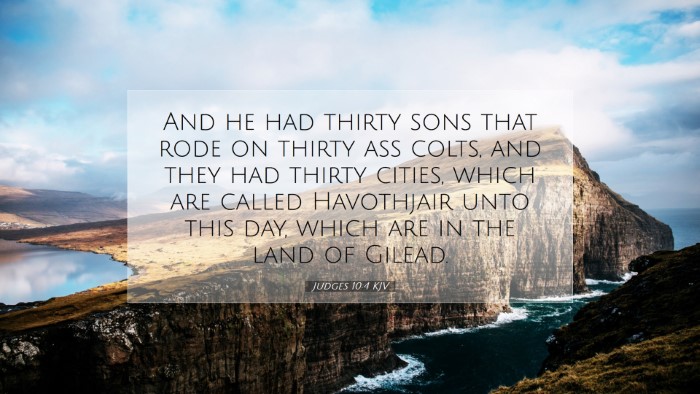Old Testament
Genesis Exodus Leviticus Numbers Deuteronomy Joshua Judges Ruth 1 Samuel 2 Samuel 1 Kings 2 Kings 1 Chronicles 2 Chronicles Ezra Nehemiah Esther Job Psalms Proverbs Ecclesiastes Song of Solomon Isaiah Jeremiah Lamentations Ezekiel Daniel Hosea Joel Amos Obadiah Jonah Micah Nahum Habakkuk Zephaniah Haggai Zechariah MalachiJudges 10:4
Judges 10:4 KJV
And he had thirty sons that rode on thirty ass colts, and they had thirty cities, which are called Havothjair unto this day, which are in the land of Gilead.
Judges 10:4 Bible Commentary
Commentary on Judges 10:4
Judges 10:4 states, "And he had thirty sons that rode on thirty ass colts, and they had thirty cities, which are called Havothjair unto this day, which are in the land of Gilead." This verse provides a glimpse into the family and achievements of Jair, a minor judge in Israel's history and serves as significant for understanding leadership and governance in the Israelite context.
Contextual Overview
Jair, mentioned in the Book of Judges, was a Gileadite who served as a judge after the time of Tola. His role represents a period of localized governance where tribal leaders emerged to settle disputes and lead the people, particularly in times of oppression or chaos. This verse indicates the prosperity and influence Jair possessed, illustrated through his numerous sons and the cities attributed to him.
Insights from Commentators
Matthew Henry's Commentary
Matthew Henry highlights that Jair's thirty sons, riding on ass colts, symbolizes both favor and influence among the people. He emphasizes the significance of having many sons in ancient Israelian culture, showcasing not only personal wealth but also a legacy of leadership and responsibility. Furthermore, the reference to the cities named after him underscores the social and infrastructural impact he had during his judgeship. Henry notes that these cities were significant in Gilead, and their continued association with Jair reflects the lasting legacy of his leadership.
Albert Barnes' Notes
Albert Barnes expands on the idea of the "thirty cities," interpreting them as an indication of Jair's administrative ability and the stability he brought to Israel during his judgeship. He notes that these cities served as centers of governance and culture, enhancing the social structure of Israel at the time. Barnes asserts the importance of local governance, exemplified by Jair’s arrangement of his sons, who likely assisted in administrating these localities. This leadership model ensured both accountability and cohesion among the tribes.
Adam Clarke's Commentary
Adam Clarke provides further analysis regarding the significance of the ass colts. He explains the cultural implications of riding on donkeys, considered a noble form of transportation in contrast to horses, which were often associated with warfare. This distinction may imply that Jair's leadership was characterized by peace rather than conflict, indicating a time of tranquility in Israel after overcoming enemies. Clarke also notes that naming the cities "Havothjair" reflects a practice of establishing a lasting heritage in the land, a reminder of Jair's contributions to Israelite society.
Theological Reflections
From a theological perspective, Judges 10:4 provides insights into divine providence in appointing leaders. God’s selection of judges like Jair demonstrates the importance of human agency coupled with divine guidance. Jair’s prosperous reign can be interpreted as a blessing from God for the Israelites during a period of relative peace. Furthermore, the legacy left by Jair through his sons and cities illustrates a continuity of leadership that is critical in biblical narratives, showing how each judge's success or failure had a profound impact on subsequent generations.
Lessons for Today
- The Role of Leadership: Jair exemplifies how effective leadership can contribute to societal stability. Today's leaders are encouraged to cultivate legacies that inspire future generations.
- The Value of Family: The presence of Jair’s sons in leadership positions illuminates the importance of family in governance, promoting familial responsibility in present-day leadership.
- Local Governance: The organization of cities reflects the need for clear governance structures, echoing the importance of local leadership in contemporary society.
Conclusion
Judges 10:4 is more than a historical account; it reflects profound truths about leadership, legacy, and the ongoing influence of God’s chosen servants. Insights from public domain commentaries enrich our understanding of this verse, presenting a multifaceted view of Jair's judgeship and its implications. For pastors, students, theologians, and scholars, this verse serves not only as a historical reference but also as a source of wisdom and guidance in contemporary contexts.


